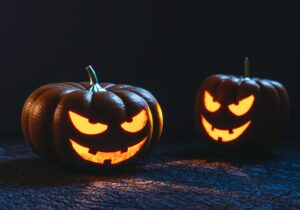Although Halloween is only one day out of the year, the whole month of October is known as the “spooky season.” And towards the end of the month, people of all ages and backgrounds gather to go trick-or-treating or get together with friends and loved ones.
Halloween’s origins date back hundreds of years – beginning with the Samhain festival in ancient Britain and Ireland. In early November, it was believed that the souls of those who died returned to visit their homes or journeyed to the other world. The living would set bonfires to frighten away evil spirits. Sometimes, participants wore masks or disguises to avoid being recognized by any ghosts thought to be present.
This festival eventually developed into present-day Halloween, shaping typical modern traditions to include carving pumpkins, trick-or-treating, and of course, putting on costumes.
Adorning costumes can be an opportunity for people of all ages to dress up and take on a persona different from their own. It can be amusing to pretend to be an alternate person, like a princess or superhero. Folks all over the world can make themselves appear as anything you can imagine, which is exactly why it can often lead to controversy.
If you haven’t seen it with your own eyes, we bet you’ve heard of disastrous and distasteful costumes people have chosen to wear. People decide to dress up as figures of hate, like Hitler. Or appropriate other cultures, like dressing up as a Native American. These types of costumes are offensive and can perpetuate destructive narratives or stereotypes. Something that is especially inappropriate and holds a long history of hatred and racism is blackface.
When a person wants to imitate another who has a deeper skin tone, one may darken their skin to appear as a different race. Although instances of people wearing blackface occur year-round, about a third of Americans think blackface is okay in a Halloween costume at least sometimes. 
But let’s get the record straight – blackface is never okay, especially in a Halloween costume.
The history of blackface dates back to the 1800s when non-black performers would mimic enslaved Africans. This perpetuation and mimicking popularized harmful stereotypes about black people, especially in cities where interaction with people of different races was limited. Today, when non-black people darken their skin to appear black, the harmful and racist history is invoked.
So, in all, when choosing a costume of culture, race, gender, or ethnicity different than oneself, take the time to reflect on the proper way to approach this. Honor the differences, rather than feed stereotypes, invoke a hurtful history, and perpetuate incorrect perceptions. And don’t use Halloween as an excuse to be racist.
